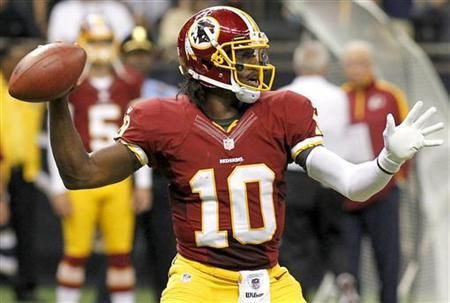Washington Redskins: A Racist Team Name That Some Journalists Are Refusing To Say

Journalists are adopting an increasingly tight-lipped method for dealing with style and usage disputes: When they object to a term, they simply stop using it.
Consider the debate over the Washington Redskins’ offensive team name and equally distasteful Indian-head logo -- a debate that has raged on for more than 20 years. Rather than simply reporting on the issue, more and more journalists, particularly in the D.C. area, are taking a stand by refusing to refer to the team by its name. The trend was thrust into the spotlight in September, when Derek Donovan, public editor of the Kansas City Star, wrote a rare editorial in which he explained the paper’s long-standing policy of referring to the NFL franchise as simply “Washington.” (The letter was published in response to a phone call from an angry Redskins fan, presumably one of many.)
“I remain unconvinced by every argument I’ve ever heard that the name is not a racial epithet, plain and simple,” Donovan wrote. “And I’ll even break my usual rule about commenting on issues outside The Star’s journalism to say that I find it inconceivable that the NFL still allows such a patently offensive name and mascot to represent the league in 2012.”
The alt-weekly Washington City Paper followed suit in October, running a snarky contest in which it let readers pick a new name for the team. (They picked the Washington “Pigskins.”)
More recently, a chorus of Washington Post writers has begun voicing objections to the name with a slew of editorials and opinion pieces. The escalating protests followed a symposium held this month by the Smithsonian’s National Museum of the American Indian. During the event, a panel of academics, historians, Native-American activists and sportswriters debated arguments for and against the football team’s moniker. The consensus was clear: Redskin is a racist term with a violent and bloody past, and the team’s owner, Dan Snyder, should do the right thing and change the Redskins’ name.
American-Indian groups -- and pretty much anyone with a modicum of politeness -- have for years blasted the Redskins’ name as an offensive throwback to America’s genocidal past. Snyder has not officially weighed in on the latest protests, but he has made it clear that he has no intention of changing the name, which dates back to the early 1930s, when the Redskins (originally the Braves) were located in Boston.
Speaking to reporters on Thursday, Bruce Allen, the Redskins’ general manager, said he and his colleagues are proud of the franchise’s history, the Washington Post reported. Translation: Don’t expect the name to change anytime soon. Those in favor of keeping the name argue that “Redskin” is an honorable term that pays tribute to Native Americans. Most recently, the Redskins’ website hosted a video in which a high school athletic coach defended the name on the grounds that some 70 high school football teams go by the name Redskins. It was a way of addressing the controversy without really addressing it.
Where most people stand on the issue is open for debate. One Annenberg election survey released several years ago found that 90 percent of American Indians -- those who should be the most offended -- found the name Redskins acceptable. Conversely, according to Indian Country Today magazine, 81 percent of respondents found the use of American-Indian names, symbols and mascots in professional sports offensive and disparaging. Many Redskins fans themselves are vehemently against the idea of renaming their beloved franchise, but then again, the majority of the football-viewing public is white.
Regardless of where you stand on the issue, the team’s name is not likely to officially change, at least in the short term. The personal stand now being taken by many journalists may raise awareness of the issue, but how successful it will be in irradiating the term from news copy remains to be seen.
A similar dustup was seen last year over the term “illegal immigrant,” which many journalists -- most notably Pulitzer winner Jose Antonio Vargas -- deemed a racial epithet against Hispanics. In response to the criticism, some publications, including the Huffington Post, swore off the term, swapping out “illegal” for “undocumented.” But the news industry’s major conversation starters, most notably the New York Times and the Associated Press, have refused to change, citing an unwavering loyalty to the grammar and style guides that have served them so well. And in the news business -- like in sports -- loyalty can be a stubborn thing.
© Copyright IBTimes 2025. All rights reserved.






















